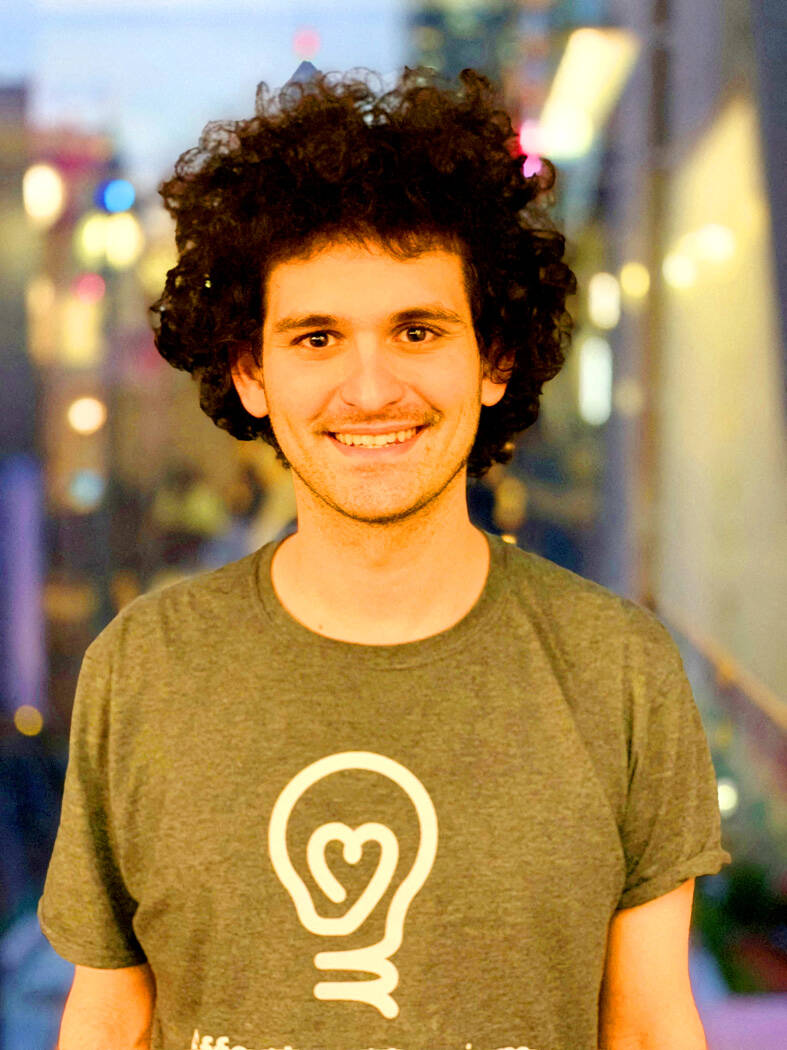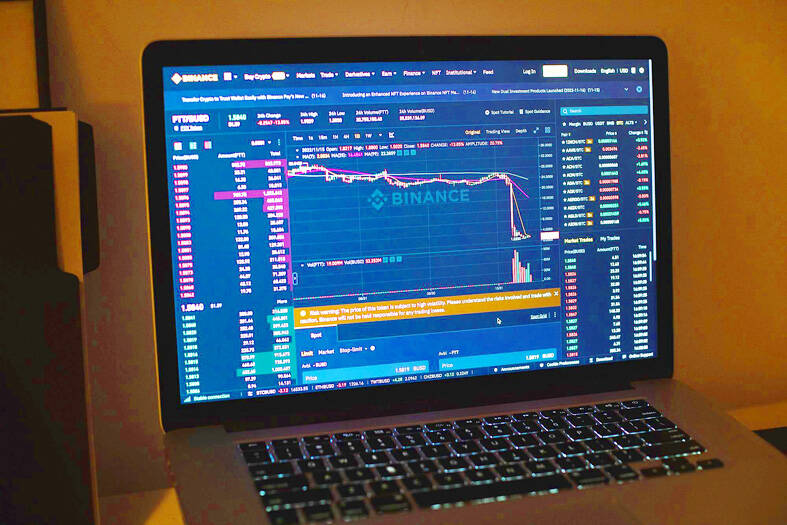Even as some of Wall Street’s old guard has an “I-told-you-so” moment after the collapse of Sam Bankman-Fried’s FTX Group, futures exchanges are not giving up on cryptocurrencies.
CME Group Inc chief executive officer Terry Duffy, who has been one of the FTX cofounder and former CEO’s fiercest critics, said he would not stop cryptocurrency futures trading just because of “one bad actor.”
Cboe Global Markets, another Chicago-based exchange, and software provider Trading Technologies also recommitted to digital assets in the wake of the FTX meltdown.

Photo: Reuters
“I’m not prepared to say I’d delist it,” Duffy, 64, last week said in an interview, in which he recalled his spat with Bankman-Fried at an industry event in March.
“We’ve been at the cutting edge of innovative products, but what we don’t do is do it in a reckless manner,” Duffy said.
The bankruptcy of FTX potentially caused billions of US dollars in losses for millions of account holders and sparked investigations into allegations of wrongdoing. It has also ensnared one of the biggest cryptocurrency lenders, Genesis Global Trading Inc, as well as Gemini Trust Co, which halted redemptions, and BlockFi Inc — a lender previously bailed out by FTX.

Photo: Bloomberg
“These events reinforce our strategy,” Chris Isaacson, chief operating officer and chair of Cboe’s digital board, said in an interview on Friday. “If there is ever a time where trust in markets needs to be built and reinforced in digital assets, it’s now. That’s what we’re committed to doing.”
Isaacson said Cboe would continue with crypto futures trading.
Trading Technologies executive vice president of product management Jason Shaffer said his firm would stay the course as well, and that customers want to engage in crypto in the same way they trade other currencies.
At a Futures Industry Association (FIA) event last week, attendants compared FTX’s collapse to energy trader Enron Corp, which went under in 2001 and became a symbol of corporate fraud.
PARALLELS TO 2008
US Commodity Futures Trading Commission (CFTC) Commissioner Christy Goldsmith Romero went as far as to draw parallels to the worldwide financial crisis.
“Opaque, complex, leveraged, unregulated products, highly interconnected market, concerns about the quality of underlying assets, high potential for contagion risk — these are the types of things that existed in 2008 that I see parallels with now,” she said.
Bankman-Fried was a driving force behind a failed campaign to penetrate traditional finance. He proposed handling every step in a cryptocurrency derivative transaction: clearing trades and eliminating the intermediaries who in many cases help spread the risk.
If approved by the CFTC, the plan could have increased risks for the traditional industry and disrupted business models like CME’s that have been around since the late 1800s.
The plan drew attacks from Wall Street firms and heightened calls for more oversight of Bankman-Fried’s firm and its rivals.
The idea was “rubbish from Day 1,” Duffy said.
“I’m surprised so many people were enamored by his nonsense,” she said.
Another critic of the plan was Intercontinental Exchange Inc founder and CEO Jeff Sprecher.
“Generally speaking, you can’t have an exchange, a market maker and a clearing settlement organization under one roof,” Sprecher told the FIA event.
Bankman-Fried, 30, has been a key donor to the Democratic Party.
He gave nearly US$40 million to candidates in the past two years, nearly all to Democrats, and has visited US lawmakers in an effort to affect developing cryptocurrency regulations.
Duffy said he hoped politicians who received the donations from Bankman-Fried would return them.
“I never bought into the whole thing,” he said.
Sprecher said that politicians who accepted his money would be quick to show that “they are not influenced by that.”
Regulators are probing whether Bankman-Fried and his associates misused customer funds, and his company’s collapse is adding urgency to a Washington push to transform the CFTC into a top cryptocurrency watchdog, CFTC Chairman Rostin Behnam said in an interview on the sidelines of the FIA event.
While the industry might take a breather for now, it would come back when confidence is restored, said Ram Vittal, North America CEO at Marex Group, a futures and options broker that has a partnership with Coinbase Global Inc.
“What is the ingredient that will be the spark?” Vittal asked. “The proper regulatory framework that allows everybody a lot more conviction so that some of these FTX-like things don’t happen.”

DIVIDED VIEWS: Although the Fed agreed on holding rates steady, some officials see no rate cuts for this year, while 10 policymakers foresee two or more cuts There are a lot of unknowns about the outlook for the economy and interest rates, but US Federal Reserve Chair Jerome Powell signaled at least one thing seems certain: Higher prices are coming. Fed policymakers voted unanimously to hold interest rates steady at a range of 4.25 percent to 4.50 percent for a fourth straight meeting on Wednesday, as they await clarity on whether tariffs would leave a one-time or more lasting mark on inflation. Powell said it is still unclear how much of the bill would fall on the shoulders of consumers, but he expects to learn more about tariffs

NOT JUSTIFIED: The bank’s governor said there would only be a rate cut if inflation falls below 1.5% and economic conditions deteriorate, which have not been detected The central bank yesterday kept its key interest rates unchanged for a fifth consecutive quarter, aligning with market expectations, while slightly lowering its inflation outlook amid signs of cooling price pressures. The move came after the US Federal Reserve held rates steady overnight, despite pressure from US President Donald Trump to cut borrowing costs. Central bank board members unanimously voted to maintain the discount rate at 2 percent, the secured loan rate at 2.375 percent and the overnight lending rate at 4.25 percent. “We consider the policy decision appropriate, although it suggests tightening leaning after factoring in slackening inflation and stable GDP growth,”

Greek tourism student Katerina quit within a month of starting work at a five-star hotel in Halkidiki, one of the country’s top destinations, because she said conditions were so dire. Beyond the bad pay, the 22-year-old said that her working and living conditions were “miserable and unacceptable.” Millions holiday in Greece every year, but its vital tourism industry is finding it harder and harder to recruit Greeks to look after them. “I was asked to work in any department of the hotel where there was a need, from service to cleaning,” said Katerina, a tourism and marketing student, who would

i Gasoline and diesel prices at fuel stations are this week to rise NT$0.1 per liter, as tensions in the Middle East pushed crude oil prices higher last week, CPC Corp, Taiwan (台灣中油) and Formosa Petrochemical Corp (台塑石化) said yesterday. International crude oil prices last week rose for the third consecutive week due to an escalating conflict between Israel and Iran, as the market is concerned that the situation in the Middle East might affect crude oil supply, CPC and Formosa said in separate statements. Front-month Brent crude oil futures — the international oil benchmark — rose 3.75 percent to settle at US$77.01